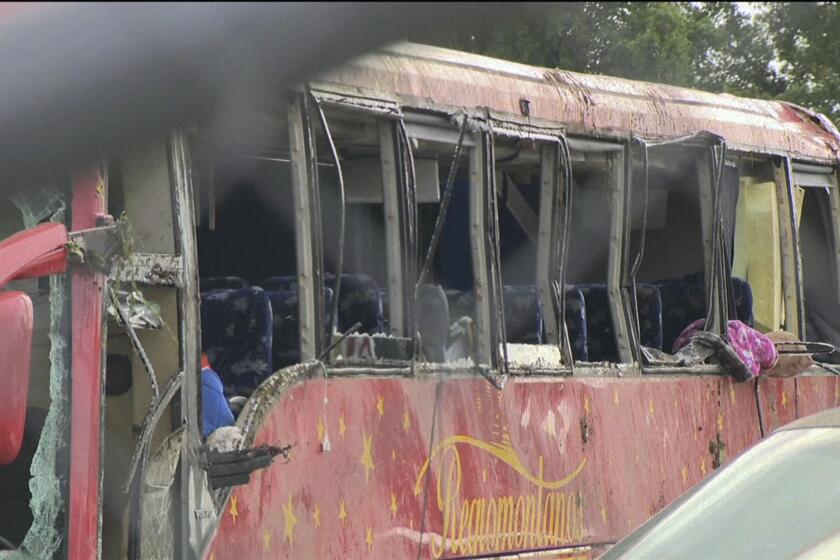Salinas’ Credibility on the Line in Midterm Elections : Mexico: President hopes to improve his government’s image. Opposition parties want to show they’re viable forces.
Packed shoulder to shoulder in the town square, an exultant crowd flashed victory signs at the 77-year-old gubernatorial candidate who has united opponents on the left and right against the ruling Institutional Revolutionary Party.
The men and women roared their approval as Dr. Salvador Nava denounced low agricultural production, water shortages and police abuses. But the loudest cheers were for his promise of a democratic government.
“Our government plan is based on respect for the will of the people, beginning with respect for their vote,” Nava said at his closing rally last Sunday night.
Democracy--in this case, free and fair suffrage--is the main issue for all parties in Sunday’s midterm election for the federal Chamber of Deputies, half the Senate and six governorships. As one of two gubernatorial candidates with a chance to upset the official party, called PRI, Nava is testing the legitimacy of these elections with his challenge of PRI candidate Fausto Zapata.
The other highly competitive race is in the state of Guanajuato, where Vicente Fox, of the conservative National Action Party, is running against President Carlos Salinas de Gortari’s old friend, Ramon Aguirre. Porfirio Munoz Lado, of the Democratic Revolutionary Party, is running a distant third.
Salinas and the PRI hope this election will mark the end of the government’s credibility crisis that began in 1985 with the contested Chihuahua state gubernatorial election and deepened with Salinas’ election in 1988. Most Mexicans believe that vote was fraudulent.
As Salinas tries to modernize Mexico and integrate his country into the world economy--for example, through a free-trade agreement being negotiated with the United States and Canada--it is particularly important to him that his government be seen as honest.
Opposition parties, on the other hand, want to show they are still viable forces, able to challenge the one-party system that has ruled Mexico for 62 years. In the 1988 election, opposition parties stunned the PRI by winning nearly half the seats in the Congress for the first time. Left-of-center parties backing presidential challenger Cuauhtemoc Cardenas won Mexico City, the country’s power center.
The PRI has had to negotiate with opposition blocs in the legislature over Salinas proposals such as free trade and would prefer to have a more docile Congress, particularly if legislation is needed to implement a free-trade agreement with the United States.
The PRI is predicting a sweep in this election--all six governorships and a clear majority in the legislature. Its polls give the party 60% of the vote, including a majority of Mexico City. The challenge, say party officials, is to convince the public that their victories are legal.
“There are people who say we should lose somewhere intentionally,” said Roberta Lajous, an aide to party President Luis Donaldo Colosio. “We can’t do that. We try to win everything. If we lose, we lose. The threat is that, if we win, we lose.”
At Salinas’ urging, the legislature last year passed laws overhauling election procedures. The laws created new federal and state electoral commissions that were supposed to be independent of the ruling party. They also established new voter rolls and credentials.
But opposition leaders say the commissions are run by PRI officials. Cardenas’s Democratic Revolutionary Party and National Action have attacked the Federal Electoral Institute for failing to distribute credentials to at least 3 million of the 39.5 million people who registered to vote.
Officials extended the distribution deadline twice but then said 8% of the cards could not be delivered because voters were not home, had moved or did not pick them up. They made a public show of destroying the cards. But opposition leaders allege as many as 10 million cards may not have been distributed and say this failure is a great opportunity for government fraud; they have offered no evidence for this charge.
In San Luis Potosi state, Nava said about 100,000 people who registered to vote did not receive their cards and, therefore, cannot cast ballots. Local elections have been won by such narrow margins.
Nava’s aides also said card distribution was wider in the countryside--where the PRI believes it is strongest--than in urban areas that have been opposition strongholds. Opposition leaders made similar complaints in the state of Guanajuato.
The opposition will have observers at nearly all polling places in San Luis Potosi, Nava said. Civic groups also say they are sending hundreds of observers to San Luis Potosi and Guanajuato. They fear the government might concede one election to legitimize a fraudulent vote in another.
In 1989, the Salinas government won international praise for recognizing the National Action Party victory in Baja state--Mexico’s only opposition governor--while the apparent theft of local elections in Michoacan went largely unnoticed.
Nava is backed by an unusual alliance of the National Action Party, the Democratic Revolutionary Party and the rightist Mexican Democratic Party--three ideologically divergent groups that formed the Potosino Democratic Coalition for this election.
PRI candbidate Zapata claims that the alliance has cost Nava the base of support he had as past mayor of the capital. “It was a tactical error to try to mix oil and water,” said Zapata, whose own campaign slogan is “Work with everyone. Listen to everyone.”
In fact, Nava’s biggest enemies seem to be not his alliance but apathy and cynicism over elections. Recent elections in Mexico, Morelos and Nuevo Leon states suffered from low turnouts, which apparently benefited the ruling party. Several residents of San Luis Potosi said they do not believe the government will allow Nava to win the governorship and, therefore, will not vote.
PRI officials say they have been working to overcome abstentions. But Aguirre, the PRI’s candidate for governor of Guanajuato, insisted: “It is not fair to assume that abstentionism represents a complaint against the established system. It could mean acceptance.”
Several voters interviewed in San Luis Potosi said they will cast ballots for the PRI because they believe the state will get more attention from the federal government if the PRI wins.
“The president belongs to the PRI,” said Rodolfo Cruz, 41, a retired government employee. “It’s better to have a governor from the same party.”
The federal government has driven that point home through its multibillion-dollar public works program called Solidarity. Money earned from the sale of state enterprises has been spent strategically in areas where the PRI was weak.
The opposition considers this practice one of the unfair advantages of the PRI. In the last few weeks, Salinas has traveled around the country inaugurating new roads and handing out land titles to boost PRI candidates.
Government funds are spent on activities of the ruling party, opposition leaders assert. Officials threaten to withhold credits from farmers if they do not vote for the PRI, they say. And the government and pro-government media will not cover the opposition fairly or, in many cases, will not allow them to advertise.
Nonetheless, Nava and a few other opposition candidates have hopes of victory.
“If there are opposition triumphs and they are respected, that would mean democracy is beginning to function in Mexico,” Nava said.
More to Read
Sign up for Essential California
The most important California stories and recommendations in your inbox every morning.
You may occasionally receive promotional content from the Los Angeles Times.






